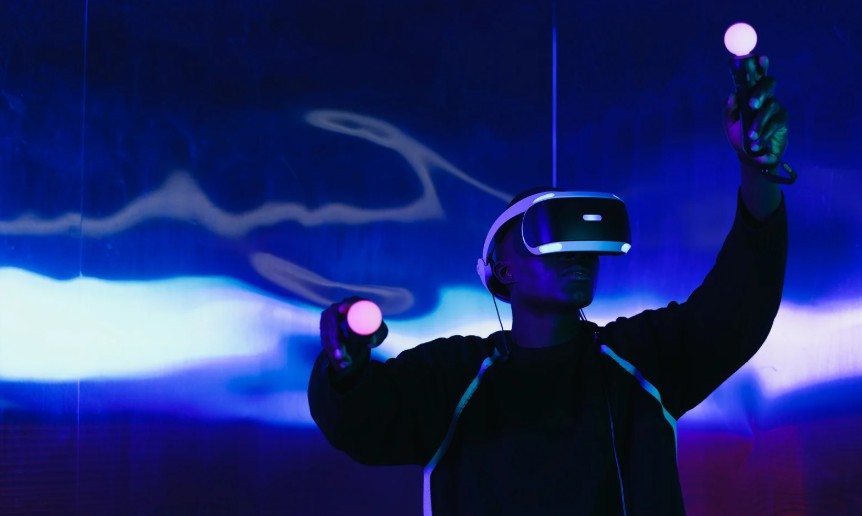Table of Contents
ToggleNew technologies like artificial intelligence are everywhere in our everyday lives. Whether I’m completing a simple Google search or test-driving a car, AI has its virtual fingers in many pies.
And it’s not just AI; there are cryptocurrencies shaking up the world of finance, and virtual reality changing gaming. Grab a friendly robot, slip on that VR mask and join me on our voyage to the future to look at the tech developments changing our lives.
Entering the Age of AI

We’re firmly in the age of artificial intelligence. Even if you’ve been living under a well-insulated rock, you must have heard of ChatGPT, or at least one of its AI siblings. It’s an everyday part of our lives; there’s an AI overview button on my page right now as I’m writing this. It’s not just affecting individuals, though; AI is also changing industries from healthcare to online casinos.
The Future of Healthcare?
AI has already begun to play a role in the healthcare industry, including in the NHS. Its ability to analyse vast amounts of data 1000 times faster than humans can means it has a wide array of applications in healthcare.
These range from precisely diagnosing illnesses to predicting future developments. I have no hesitation in saying that AI will play a part in the future of medicine.
Screening for Breast Cancer
One way AI is changing medicine is through enabling the early detection of breast cancer; 9% of American radiologists are already using AI when screening. Scientists have been able to train AI to establish a pattern showing the average screening by inputting data from hundreds of thousands to millions of mammograms.
Once the AI has determined what a screening should look like, it can then detect those that stray from it. It can identify the smallest anomaly, which might sneak past even the best doctors. The program is continually learning as it gathers data from more and more screenings, so it will only increase in accuracy as time goes on.
Predicting the Future
In a way, I find this next use slightly terrifying! AI can also be used to predict illnesses that haven’t yet developed. It’s as grim as it is miraculous. By inputting a patient’s information, AI can suggest which illnesses they’re at risk of developing.
The algorithm takes into account things like your blood pressure, cholesterol, and hormones combined with your medical history to produce a profile of your health. Then, it suggests which illness you could develop, allowing for intervention before the problem has even occurred.
It’s a massive leap into the future for healthcare moving from treatment to prevention could change the sector forever. The predictive model isn’t yet used widely because of concerns around confidentiality and the overwhelming amount of data that would have to be analysed.
However, a similar form is already being used to personalise treatments. Based on the same medical details, it creates a personalised treatment plan for a patient, giving the exact best care for them.
Revolutionising Online Casinos
In the almost ten years I’ve worked in the online casino industry, I’ve seen AI completely revolutionise it. The tech seems to have touched every aspect of the market, from customer service to personalisation.
Improving Customer Service
You’ve likely seen AI chatbots used in customer service at this point; they’re certainly common in the casino industry. These chatbots are popular because of their ability to answer customer concerns within minutes, or even seconds.
They find the right answer by scouring the Internet for information. Of course, we’ll always have issues that only humans can get to the bottom of, that’s why it’s important AI can free up human representatives for the more complex queries.
Did You Know the First Chatbot was Invented in 1966?
It might blow your mind, but it’s true! The first chatbot was invented back when the majority of us only thought of a mouse as an animal. MIT professor Joseph Weizenbaum created the first chatbot, Eliza, on a typewriter in 1966. Eliza interacted with users by following a set of rules to generate a relevant response.
Increasing Personalisation
Every experience at online casinos is becoming more personal. Whether it’s the games I’m recommended or the ads I see, it all reflects my preferences. That’s thanks once again to AI’s incredible data analysis capabilities.
By looking at my history, AI is able to determine my preferences. It can determine I’m a fiend for slots and then recommend me further slot games I’m likely to enjoy.
Similarly, ads are also personalised to our tastes. Have you ever been talking about a product and then seen it advertised when you’re scrolling the net? That’s not Google reading your mind, it’s AI analysing your preferences! So, I’m more likely to see slot ads when I’m playing at an online casino.
New Ways to Pay

In our digital world, AI isn’t the only technology shaking things up. There’s also cryptocurrency, the revolutionary way to pay that is changing the finance industry forever.
These decentralised and digital currencies are worth a staggering combined $3.87 trillion. Not only are they a sizable industry in themselves, but they’re also changing the way we pay at other businesses.
You don’t have to go far to find a business accepting crypto payments there are over 15,000 of them worldwide. Many online casinos accept the most popular coins, including Ethereum, Bitcoin, and Litecoin. You can even pay for your weekly shop at Asda or Tesco using cryptocurrency!
Why are Cryptocurrencies Popular?
Cryptocurrencies face lower transaction fees than other forms of payment. Users often only have to pay the minimum blockchain fee. They’re also much faster than other forms of transactions, with money arriving in your account in minutes.
Their appeal also lies in their decentralised nature. Cryptocurrencies aren’t subject to the whims of a central institution like a national bank. These institutions like the Bank of England with the pound, have a lot of control over their currency.
They set levels of inflation, which can impact how much my money is worth. Crypto is completely independent of this, allowing greater control.
The New Virtual Reality
From automotive to entertainment, virtual reality is another tech innovation that is leading the charge of change. Using VR headsets, you’re immersed within the virtual world, bringing you closer to the action than ever.
Taking a Test Drive
VR is used by some of the biggest names in the automotive industry, including BMW and Honda. It allows for the ultimate test drive. Engineers can test the performance of vehicles and see how a car will look before they bring it to life.
It’s a popular innovation in the industry because it saves both time and money. Rather than having to create complicated and expensive prototypes, engineers examine the VR version. It makes working around the world much easier, with all teams able to see the design as it becomes reality.
Changing the Game
One of VR’s most obvious uses is in entertainment and gaming. Whether it’s a VR casino or sporting game, the tech creates a highly immersive experience.
Dodgecraft, which replicates the experience of a rugby game, is one example. Players weave, dodge and tackle, combining the fun of gaming with sports.
Professor Cathy Craig believes that the combination could finally allow VR to dominate gaming, saying, “It’s like a play simulator that allows you to train those important sporting skills.”
VR headsets have been around a while longer than you’re likely to realise. Yet they haven’t fully captured public attention. Their high price point, limited games, and clunky appearance are some of the reasons for that.
However, with the tech becoming more accessible and more games being developed, I think we could see VR being used in more industries and homes in the near future.
When do You Think the First VR Headset was Made?
Again, this one might surprise you! The first VR headset actually traces its origins all the way back to 1968. It was created by Ivan Sutherland and Bob Sproull and called the Sword of Damocles.
The 3D shapes users watched were created using wire, which only moved when they turned their head. This original VR set never made it out of the lab because it was so heavy that it had to be suspended from the ceiling.
How has Technology Impacted Industries?

Imagine a single day in your life without any modern technology. It would be completely unrecognisable. That’s because recent tech innovations have touched every part of our lives.
Whether it’s the way we pay for things, our health, or how we game, tech plays a part in everything we do. The likes of VR and AI have helped pull industries, from cars to casinos, into the future.
While I may not have a crystal ball to tell me where tech like AI will take us, I can confidently say it will play an important role in both industry and everyday life.




